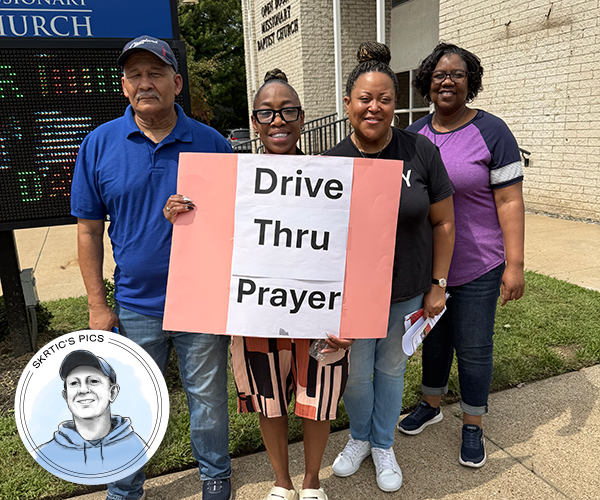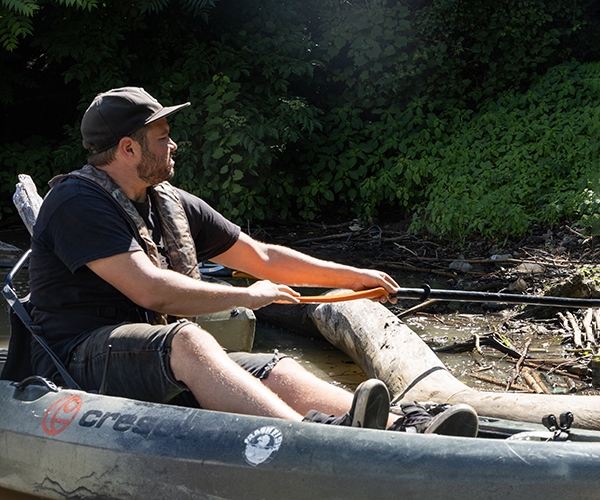Tim Miller’s cell phone is a time bomb that barely ticks between shrill rings. The straight-shooting Texan prefers a no-frills conference call ringtone, and it sounds off about every four minutes. Tim responds each and every time as though it’s an electric shock.
“My heart gets broken every single day,” he tells me, reaching for the phone. He whips it out of his pocket with the cool dexterity of a cowboy flipping a handgun out of a holster. “Texas-Equusearch-Tim-Miller,” he exhales in a single, fluid syllable.
Tim already knows that tragedy awaits on the line. A family with a missing person to report. A sister with new information. A son with a lead. “Mr. Miller, can you please help?” they ask him.
Tim can’t say no.
In 2000, seven years after his daughter Laura went from missing person to found-but-forever-gone, Tim founded Texas Equusearch, a volunteer mounted search-and-rescue organization for missing persons. Since then, his grassroots rescue group — its use of horses explains why “equine” is embedded in the name — has grown to more than 350 volunteer members.
“Someone made a choice to take Laura’s life and change mine,” he says, at peace with the career script he says God wrote for him.
Laura, 16 when she disappeared, was found murdered a year and a half later. Her case is unsolved.
Equusearch is how Tim fights back. He has personally searched for more than 750 missing persons (including five trips to Aruba to look for missing Alabama teen Natalee Holloway) and rallied 44,000 volunteers. He employs divers, drone planes, infrared technology, horses, dogs, helicopters, 4x4s — whatever resources he can secure through donations and sponsors. Equu-search dials up the urgency on missing persons cases and helps law enforcement fill gaps in manpower, resources and media attention.
“When we get the call, it doesn’t matter where it’s at. We’ll be there,” Tim assures me.
This time, the call is from Cleveland.
Tim, who lives near the Texas Gulf Coast, was born in Cleveland 60 years ago. He lived on West 97th Street as a baby and bounced in and out of foster homes, eventually landing in Wellington, in Lorain County, where he graduated from high school.
Tim calls my husband, Haven, “cousin,” though there isn’t blood between them. Tim was a surrogate brother to Haven’s father back in Wellington. Cousin Tim is close as kin. He calls our home weekly, reminding Haven to tune in to the 11 o’clock news. Tim sets up a media buffet in every city where he stages a search — which pressures police, encourages volunteers, heats up the cold cases.
Tonight, he’s meeting Robert Walker and Greg Washington at our home on the West Side to discuss a search strategy for Gloria Walker, a 46-year-old black woman from Cleveland’s Slavic Village neighborhood who went missing May 20. Robert is Gloria’s brother, Greg is the father of her 14-year-old son.
Cold beers sweat from the August humidity. The night is heavy with heat and completely still, except for an occasional dog walker and the sound of streetlights buzzing. We wait for Robert and Greg to arrive. Later, 19 Action News will arrive to film Tim, and Gloria Walker’s name will cross people’s lips again.
When Robert and Greg arrive, they approach Tim like a lost brother, embracing his wiry 5-foot-8 frame. He looks breakable next to the solid men. Robert pinches back a tear. Greg pumps Tim’s arm. After three months, a rally, several family-led searches and a police investigation, they think Tim is their last hope.
Tim doesn’t dangle false promises. He avoids any wild optimism that Gloria may still be alive. What he says is blunt, but softened by his references to Laura and his own hurt — something no one has yet offered Greg and Robert: complete understanding.
“There’s only one thing worse than having a murdered loved one, and that’s knowing that they are out there dead and not being able to say goodbye,” Tim acknowledges sadly. His words are a chorus line. A-men, someone understands.
“Gloria was like a tiny blip on the radar,” Washington says of the press coverage of her death. “There are a ton of missing people in Cleveland. They are treated like runaways.”
That weekend, Tim will organize a search for what’s left of Gloria.
For now, he studies his new friends, his eyes the first to start the conversation. Glassy blue and urgent, sometimes bloodshot from three-hour naps sufficing as a night’s sleep, they are a prologue. One look and you see hard times: life on cigarettes and despair, experience deeply creased into sun-tough skin.
Another look and you see relentless purpose and a wild coyote ready to push the boundaries. This seems fitting for a man whose playground is the undeveloped areas of Galveston County, Texas, where he now lives on a ranch. He spends little time there.
“I know your lives will never be the same as it was,” he says, evenly. “Even if Gloria is found, it won’t be the same. But you will have a spot to go on her birthday and a spot to visit on Mother’s Day, a place to put flowers.”
Robert’s left hand kneads tension from his forehead.
Tim probes for details about an ex-boyfriend of Gloria’s who has not been questioned. He asks about a beer joint where Gloria used to go. The conversation goes like this for an hour, Tim interjecting confidence in his ability to find Gloria. Drops of hope.
Greg produces a notebook with disheveled papers and a day planner. He points out the date of his first search, with his son, Khyel, 14, and Robert.
May 27: Gloria Hunting, the calendar box reads.
They schedule the next search, with Tim leading, for Saturday, Aug. 18, in Slavic Village.
Robert and Greg e-mailed Tim in June after seeing him on television with 4,300 searchers, all assembled in the Canton area to find Jessie Davis. The pregnant woman’s boyfriend, Bobby Cutts Jr., is now charged with murdering her. That same weekend, a rally to draw attention to Gloria’s case, staged in Cleveland by the local group Survivors/Victims of Tragedy, was quiet in comparison, with about 70 to 100 people attending.
Judy Martin, of Euclid, who founded the group in 1997 after her son was murdered, says she’s certain why Davis’ disappearance got more press. “She was young, white and pregnant,” Judy remarks. “What better combination to get attention?”
Gloria’s brother Robert contacted Tim because he wanted more publicity, more response.
“The difference between Tim Miller’s group and mine is I don’t have dogs or horses,” says Judy, whose group spreads word about disappearances with rallies and fliers. “We don’t have the resources he can offer.”
Tim contacts law enforcement, friends and family of the missing person, news stations, churches. His cell phone usage averages 8,000 minutes each month. His charisma is contagious, which explains his success in assembling search teams in cities where he doesn’t know a soul.
Detective Pat Chism of Cleveland’s Third District Detective Bureau, which is investigating Gloria Walker’s case, welcomes the help.
“There is nothing locally that functions the way Tim does,” she says. “It helps families to know that someone is still trying to find their loved one.”
Equusearch has about 350 volunteers nationwide. Many joined after Tim led searches for their missing family members. Only Tim and two other employees work on cases full time. The public nonprofit, which relies completely on direct public contributions, raised more than $200,000 in 2005. Tim uses a meager portion of this — about 10 percent — for salaries. In 2005, he paid himself $12,550.
Capt. Dan Veloski, a Cleveland Metroparks ranger who has helped search for Walker, says Texas Equusearch is unlike local search and rescue teams. There are eight urban search and rescue teams in Ohio, made up of fire fighters and other law enforcement officials. There are mounted groups, K-9 units, neighborhood watch groups, but no hybrids like Equusearch that combine experienced and “spontaneous” searchers.
As they partner with Tim, the police are still investigating Gloria’s case. “I haven’t given up yet,” Detective Chism says.
Robert isn’t sure how he’ll react if he finds something real. A piece of her.
On Saturday, Aug. 18, he and Greg, Detective Chism and some of her colleagues — 80 total searchers, including family and friends — meet at St. Hyacinth Church on Francis Avenue off of East 55th Street.
“The only thing I could think about was preparing for the unexpected,” Robert says. “What would I see? How would she look? Would I be cool and calm or a nervous wreck? Would I break down into tears? Or, would I say, ‘OK, I found her. I can alert the police and say it’s over.’ ”
Cindy Wisdom, a case manager with Equusearch, put the search into perspective. “You’re looking for your grandmother’s wedding ring in a field,” she asserts.
Look for clues, not a body, she says. Look for bones — they will be blackened, not ivory white or even discernibly human. Look for clothing: the red sweatpants Gloria wore, the fabric necklace that held keys and a plastic pacifier charm.
Tim leads the Gloria search on foot. People trickle in slowly all morning — all ages, friends and strangers. At 10:30 a.m., Tim dispatches teams. He designates a leader of each group who will communicate with him via cell phone. Searchers are instructed not to touch possible evidence, but to alert the leader so Tim can scrutinize it.
Inside abandoned homes with plywood windows, only graffiti and litter are left behind. No sign of Gloria. Some groups scour the alleyways that budge between houses and connect side streets like Chutes and Ladders.
Greg uncovers brittle, rotting animal bones close to the railroad tracks at nearby Bessemer Avenue. Searchers push through some shoulder-high grasses and inspect the railroad area. A fresh mound of dirt is discovered, and Tim darts to the site, calling on the detective and railroad authorities.
“The police took interest in that,” Greg remarks.
But it was nothing.
The day wears on, with cell phones ringing and Tim manning headquarters.
“I have to say we ran up on a cold trail,” admits Detective Chism.
But Robert and Greg find hope. “I’ve learned more from Tim and Cindy by going into the trenches,” Robert says.
The following Sunday, Tim leaves Cleveland to investigate another call. Always, the most difficult part of his job is deciding when to go home.
“There is never a right time,” he says.
Tim never thought his Texas search crew would become national news or a model for other search teams. But the need for such organizations is apparent from Tim’s schedule. While in Cleveland for five days, he received 14 calls from Ohio families. Some learned about him from the television report shot on our lawn.
He makes plans to return this fall with his RV and several team members, so he can mobilize searches to follow up on those 14 calls. But the fresh cases come first.
Robert admits that Gloria’s file seems stale, considering the latest news. “I hope my sister doesn’t become a cold case,” he says.
Equusearch’s home office is working on operations manuals so it can duplicate his system and form branches. It’s a work in progress. For now, when the phone rings, Tim answers the call.
And he won’t say no.



